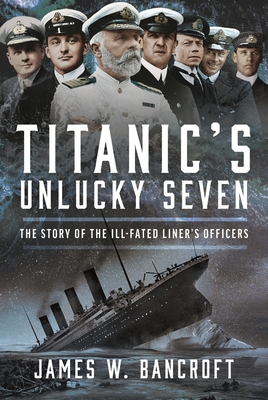Titanic's Unlucky Seven: The Story of the Ill-Fated Liner's Officers

Titanic's Unlucky Seven: The Story of the Ill-Fated Liner's Officers
The people on board were proud to be part of the ship's highly-publicized first voyage, but as the first batch of officers reported for duty in Belfast to prepare her for her trial trip to Southampton and beyond, they could not have imagined the fate which awaited them. Titanic was, after all, 'unsinkable'.
It is exclusively through the eyes of seven unlucky men - the small group of officers onboard for that doomed voyage - that the author reveals the tragedy as it unfolded that night in April 1912. From their assignment to the White Star liner through to their eventual fates.
Each one of these seven men behaved with great courage and discipline in a situation beyond anything they had previously experienced and some of the officers left accounts of the horrors they witnessed. Of this small group, four were members of the Royal Naval Reserve; this included Charles Lightoller, who was the Second Officer and in charge of loading passengers into lifeboats on the port side. He was noted for strictly enforcing the 'women and children only' principle, allowing only those men needed for manning the boats to join them.
Four of the seven officers survived the ordeal. As the author reveals, one of them had only been formally appointed to the crew the day before Titanic sailed on its climatic maiden voyage. This was Henry Tingle Wilde, who was scheduled to sail with Titanic's sister ship, Olympic, but who was switched to Titanic as the Chief Officer. He reported for duty on the very day the ship departed Southampton. This move meant a reshuffle of the officers and, as only seven officers were deemed necessary, Second Officer David Blair was removed from the crew list and sent ashore. He was certainly the luckiest of all. The unfortunate Wilde went down to the bottom with his ship.
Of the many questions asked about that night is that of the fate of Captain Edward Smith. His body was never recovered and it had naturally been assumed that he too had been lost. In Titanic's Unlucky Seven, James Bancroft questions if this might not actually be the case. There is evidence that Smith may have survived the sinking, and was seen and spoken to months after the event by a man who had sailed with him, and
PRP: 216.69 Lei
Acesta este Prețul Recomandat de Producător. Prețul de vânzare al produsului este afișat mai jos.
195.02Lei
195.02Lei
216.69 LeiLivrare in 2-4 saptamani
Descrierea produsului
The people on board were proud to be part of the ship's highly-publicized first voyage, but as the first batch of officers reported for duty in Belfast to prepare her for her trial trip to Southampton and beyond, they could not have imagined the fate which awaited them. Titanic was, after all, 'unsinkable'.
It is exclusively through the eyes of seven unlucky men - the small group of officers onboard for that doomed voyage - that the author reveals the tragedy as it unfolded that night in April 1912. From their assignment to the White Star liner through to their eventual fates.
Each one of these seven men behaved with great courage and discipline in a situation beyond anything they had previously experienced and some of the officers left accounts of the horrors they witnessed. Of this small group, four were members of the Royal Naval Reserve; this included Charles Lightoller, who was the Second Officer and in charge of loading passengers into lifeboats on the port side. He was noted for strictly enforcing the 'women and children only' principle, allowing only those men needed for manning the boats to join them.
Four of the seven officers survived the ordeal. As the author reveals, one of them had only been formally appointed to the crew the day before Titanic sailed on its climatic maiden voyage. This was Henry Tingle Wilde, who was scheduled to sail with Titanic's sister ship, Olympic, but who was switched to Titanic as the Chief Officer. He reported for duty on the very day the ship departed Southampton. This move meant a reshuffle of the officers and, as only seven officers were deemed necessary, Second Officer David Blair was removed from the crew list and sent ashore. He was certainly the luckiest of all. The unfortunate Wilde went down to the bottom with his ship.
Of the many questions asked about that night is that of the fate of Captain Edward Smith. His body was never recovered and it had naturally been assumed that he too had been lost. In Titanic's Unlucky Seven, James Bancroft questions if this might not actually be the case. There is evidence that Smith may have survived the sinking, and was seen and spoken to months after the event by a man who had sailed with him, and
Detaliile produsului









